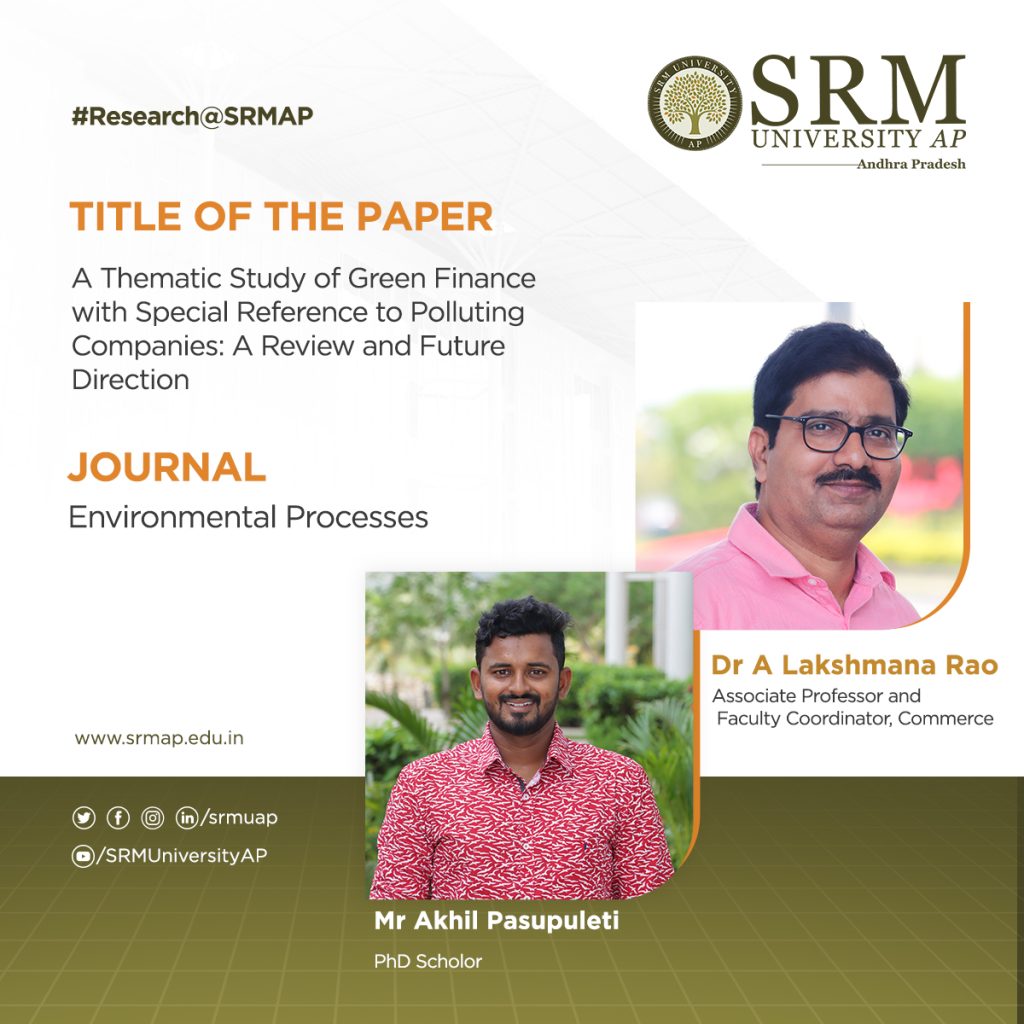- A Thematic Study on Green Finance June 2, 2023
 Today, we live in a world where sustainability and sustainable development are the need of the hour and amidst this, Associate Professor, Dr A Lakshmana Rao and Research Scholar, Mr Akhil Pasupuleti from the Department of Commerce have come up with their pacesetting research publication titled – “A Thematic Study of Green Finance with Special Reference to Polluting Companies: A Review and Future Direction.” The research work gives an impetus to many polluting companies to adopt green finance as an option to combat environmental pollution, this can be in the form of business strategy, energy saving, green credit, and innovation.
Today, we live in a world where sustainability and sustainable development are the need of the hour and amidst this, Associate Professor, Dr A Lakshmana Rao and Research Scholar, Mr Akhil Pasupuleti from the Department of Commerce have come up with their pacesetting research publication titled – “A Thematic Study of Green Finance with Special Reference to Polluting Companies: A Review and Future Direction.” The research work gives an impetus to many polluting companies to adopt green finance as an option to combat environmental pollution, this can be in the form of business strategy, energy saving, green credit, and innovation.Abstract
The objective of the study was to understand the phenomenon of green finance in polluting companies through a systematic literature review. The methodology involves the search, selection, classification, and categorisation of thirty-five articles on green finance in polluting companies which were analysed for the time span of eleven years, i.e., 2011–2022. The outcome of the review identified the following five themes: (i) green credit and environmental protection; (ii) green finance and green innovation; (iii) green innovation and environmental protection; (iv) green finance and investment; and (v) green innovation and firm performance. The review has put forward recommendations for further advancement in policy strengthening and the utilisation of extensive data analysis, indicating potential avenues for future research and development. The findings of the study provide insights to researchers, practitioners, and policymakers about the status of green finance in polluting companies.
Dr Lakshmana Rao Ayyagari and his student Mr Akhil Pasupuleti are working on developing future prospects of Green Finance such as ESG disclosure and reporting practices, its application and the relationship of CSR and sustainability.
Continue reading → - Tracking the growth of health expenditure in the Middle East May 25, 2022

Middle East countries are characterized by a growing burden of chronic diseases such as diabetes, cancer, cardiovascular diseases, and respiratory diseases in recent times. These are health conditions that require regular access to care in order to lower their morbidity and mortality burden. Hence, healthcare-focused research and development spending has the potential to uncover new methods for the diagnosis and treatment of different health conditions, lower their cost of care, along with reducing morbidity and mortality burden in the population.
Having conducted comprehensive research in this regard, an article titled “Predicting Key Drivers for Health Care Expenditure Growth in the Middle East Region: A Grossman-PLS Modeling Approach” has been published by Dr Shailender Singh and his PhD scholar Mr Muhammad Muazu Bala from the Department of Commerce. It was published in the Journal, ‘Expert Review of Pharmacoeconomics & Outcomes Research’ having an Impact Factor of 2.31. The research was led in collaboration with Dr Nishant Kumar from Amity University, Noida.
The results obtained from the study show that the supply side of care (HSCI) has contributed more than the demand side (SDI) in determining the overall level of health care expenditure of the Middle East countries. This implied that massive investment targeted at achieving high-quality healthcare systems is more noticeable in determining the overall level of health care expenditure. Though progress towards a high-quality health system is a desirable health care goal, particularly for LMICs (Low- and middle-income countries), available evidence shows that expenditure on research and development is quite low.
The study recommends an expansion of health insurance coverage to induce greater utilization of health care services particularly among the aging cohort of the population. The promoters of Universal Health Coverage (UHC) such as the World Health Organization (WHO) and the World Bank have emphasized that obtaining health insurance coverage will induce greater access to health services without facing financial hardships. In line with the findings of this study, since real wage is statistically significant, mandatory employment-based health insurance may induce greater utilization of health services and provide financial risk protection for formal sector employees.
However, this alone will not suffice to achieve greater improvement in health outcomes, especially for LMICs characterized by the largest share of informal sector employment. Thus, other forms of health insurance such as community–based health insurance may help to cover the informal sector and the vast segment of the population that lives in rural areas. Moreover, other pro-poor publicly financed health care payment mechanisms could be a promising path for promoting access to health services and guaranteeing financial risk protection for the poor.

The research infers that health system stakeholders in the Middle East should prioritize exploiting the available resources for strengthening the capacity of their health systems. Also, available data shows that expenditure on research and development is quite low and thus should be considerably increased so that new inventions, innovations, and discoveries could be unleashed for better understanding, treatment, and diagnosis of different health conditions for improving health outcomes.
Abstract of the Research
Initially, this study provides empirical evidence to the Grossman theoretical model using macro-level panel data for 15 countries of the Middle East region from 2000 through 2016. During the second phase, contradistinction analysis is executed and a parallel model of the demand for care as a function of health system capacity indicators is estimated. Lastly, for robustness checks, a new predictive model is developed carrying forward the outcome from Grossman and the parallel models. A variance-based partial least square structural equation modeling (PLS-SEM) is applied to analyse the interaction between health expenditure and the latent construct: socio-demographic factor and health system capacity. Results elucidate that the relative wage rate and the ageing variables are the only indicators that are statistically significant with theoretically consistent signs as postulated by Grossman’s theoretical model. The exact opposite is true with schooling and the proxy of the medical care relative prices. However, in the parallel model, all the four drivers of the demand for care are statistically significant with robust standard errors. Therefore, the Middle East’s data has comparatively a better fit in the parallel model than it does in the Grossman model. Also, the integrated estimation model supports the results of the separate models.
- Going green is the new fashion March 31, 2022
The Department of Commerce is glad to announce that Dr Shailender Singh, Associate Professor, published a paper titled ‘Pro-Environmental Purchase Intention Towards Eco-friendly Apparel: Extension of the theory of planned behavior model’ in the Journal of Global Fashion Marketing published by Taylor and Francis. The research is conducted in collaboration with Dr Nishant Kumar, Amity University, Noida.
Abstract of the Research
In this study, the theory of planned behaviour (TPB) model is employed with environmental concern, personal moral norms, and perceived consumer effectiveness to better predict the eco-friendly apparel purchase intention of educated Indian youths. Variance-based partial least square-structural equation modelling (PLS-SEM) is applied to evaluate the hypothesized model. Findings indicated that perceived behavioural control has a strong significant positive influence on purchase intention, followed by personal moral norms, attitude, and perceived consumer effectiveness. Environmental concern is found to indirectly affect purchase intention through three primary TPB variables and personal moral norms. Multi-group analysis (MGA) examines the moderating effect of perceived consumer effectiveness on an attitude–intention relationship. The highly perceived consumer effectiveness group is shown to have a more consistent attitude-purchase intention relationship as compared to the low-perceived consumer effectiveness group. The study promulgates insights to professionals and policymakers to formulate sustainable marketing strategies and policies to cope with the indigenous market conditions.
The textile industry has emerged as a significant pollution source owing to a rise in carbon footprint, the spike in greenhouse gas emissions, and increasing landfill waste. Sustainable fashion has become a new style statement, and industries are shifting their orientation towards environment-friendly manufacturing. A plethora of research studies have been conducted to explore consumer behaviour intention towards visiting green hotels, green products, organic food, and electric vehicles. Studies have also been done to understand consumer behavioural intention toward sustainability in apparel, sustainability, social media communication, ethical fashion consumption behaviour, and eco-friendly apparel in developed countries. However, the paucity of research studies examining the influential factors affecting purchase intention of eco-friendly apparel in a developing economy makes this study more imperative.
This study furnishes the problem by examining the eco-friendly apparel purchase intention of the educated Indian youth in the sustainable apparel framework by investigating the potential of three core predictors of purchase intention in the theory of the planned behaviour model. Furthermore, the study extends the model by adding three more variables: environmental concern (EC), personal moral norm (PMN), and perceived consumer effectiveness (PCE). Moreover, this study also examines the PCE as a moderator between consumer attitude and eco-friendly apparel purchase intention (PI), which adds to the existing body of knowledge. The study promulgates insights to professionals and policymakers to formulate sustainable marketing strategies and policies to cope with the indigenous market conditions.
Based on the proposed extended framework, the study disseminates several practical implications to attain sustainability in fashion:
(i) The strong PBC influence on apparel purchase intention would facilitate marketing professionals to support consumers with sustainable apparel choices through clear visibility, long-term benefits, and striking design with a vast form of offerings, sustainability certification, and ease of access.
(ii) It has also been observed that youth’s moral obligation to behave ethically no longer depends on social pressure. Consumers may feel that the discussion on pro-environmental intention is not having social acceptance. Policymakers must bring opinion leaders to pitch the benefit of using organic clothing so that it can be discussed socially and develop suitable sustainable purchase intent.
(iii) Marketers should use vivid marketing communication tools to educate customers about the attribute-based benefits of organic apparel and the technological difference which makes it different from fast fashion.
(iv) Policymakers should sensitize people about the deteriorating environment and try to teach pro-environmental intent through green info-commercials, organic apparel labels, socio-environmental themes in products, and affordable pricing strategies.
(v) Marketers may adopt various media platforms to showcase how individual-specific green behaviour is self-sufficient in combating environmental problems. This would increase the PCE level among people, further leading to an attitudinal shift.The Indian government can launch an awareness campaign based on the theme of environment protection through individual contributions and urge citizens to accept green as a socially accepted norm.
- Varying impact of health expenditure in Southeast Asia March 24, 2022
Health expenditure assumed enormous importance with the outset of coronavirus pandemic. The disparity between public and private health expenditure will often reflect in the health outcome of any nation. Through the research paper titled ‘The dynamics of public and private health expenditure on health outcome in Southeast Asia’ published in the journal Health and Social Care in the Community, Dr Shailender Singh, Associate Professor, Department of Commerce, attempts to argue that public expenditure on health has a substantial impact over private spending across the countries of ASEA.
Abstract of the Research
This study examines the dynamics of public and private health expenditure on health outcomes in Southeast Asia, vis-a-vis two of the Sustainable Development Goals (SDGs). The techniques of fixed effect, random effect, and feasible generalized least square methods are employed to obtain robust estimates. Further, the analysis dives deep into the country-specific impact of public and private health expenditure on health outcomes using the technique of seemingly unrelated regression. Estimates show that, across Southeast Asia, public health expenditure alone contributes to improving life expectancy at birth, lower levels of under-five, and non-communicable disease mortality rates. Unlike public health expenditure, private health expenditure contributes to better health outcomes only in Brunei and Singapore but not across the countries of Southeast Asia.
The paper asserts that, despite the statistical significance of private health spending with respect to the health outcomes, it does not contribute to lower mortality rate (MR) and higher life expectancy at birth. The results strongly support several prior pieces of evidence in the literature regarding health expenditure and health outcomes. The country-specific estimates show that public health spending contributes greatly to lower mortality rate, particularly in Brunei and Singapore. By contrast, private health spending does not contribute to lower levels of U5MR and NCD mortality rate across the countries of ASEA except in Cambodia, Indonesia, and Philippines.
The differences in economic development and the settings of health systems in these countries could be a plausible reason for the inability of private health expenditure to contribute to lower levels of NCD mortality rate in most of these countries. The result implies that more funding to the public health system has the potential to lower U5MR and NCD MR close to the SDGs target across the countries of ASEA. Also, strengthening the health system through providing greater access to preventive services for diabetes, hypertension, respiratory diseases, and cancers at primary care units may help in better diagnosis and management of these chronic conditions in Indonesia, Laos, and Myanmar where NCD MR is relatively high. However, an increase in funding alone may not be sufficient at improving health outcomes. For emerging conditions, diet modification, active physical exercise, little tobacco and alcohol consumption are also imperative.
The research is reported to be the first of its kind that examines the dynamics of public and private health expenditure on health outcomes in line with the SDGs targets. Apart from the traditional indicators commonly used as health outcomes in the literature (life expectancy and U5MR), the study further extends the literature by introducing NCD MR as an additional health outcome which could play a pivotal role in providing empirical evidence to the health policymakers and researchers.
Health plays an important role in promoting human capital and the economic growth of a country. The available stock of human capital in a country determines the rate of growth in its per capita income. A healthy individual contributes more to their economy by allocating more hours to work, earning more disposable income, in turn investing more in human development.
As the individual stock of health tends to diminish over time, there is a need to augment it by making more investment in time, income, and regular medical care. Thus, this research work has a societal benefit for the population of Southeast Asia to identify the threats in the field of health and focus more on their well-being for improving the state of health. Dr Singh conducted this research in collaboration with Dr Nishant Kumar, Amity University, Noida.
In future, he also intends to analyse the impact of socioeconomic and behavioural health determinants on the health system efficiency of the Middle East region, and to predict the key drivers for health care expenditure growth in the Middle East region through Grossman-PLS Modeling Approach.



